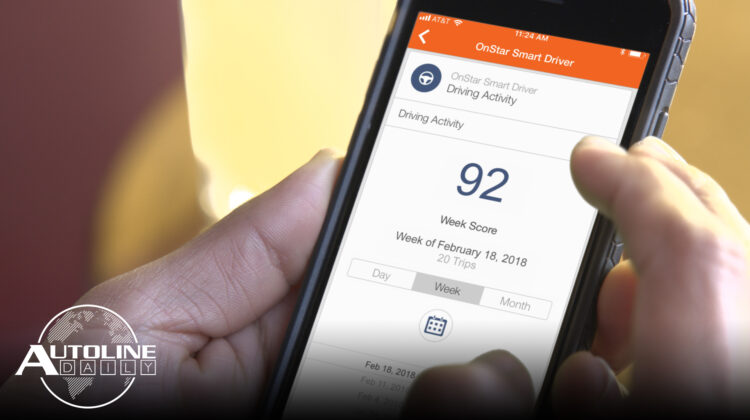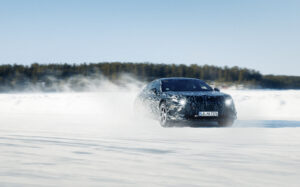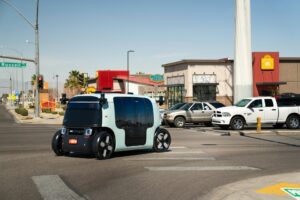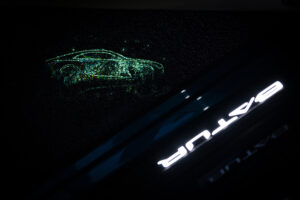
Follow us on social media:
Runtime: 9:42
0:00 GM Sued for Selling Customer Data
1:31 Ford’s Farley Smooths Ruffled Dealer Feelings
2:18 AMG Shows Off First Dedicated EV Platform
2:50 VW Develops €20,000 ID.1
4:01 Zoox Robotaxi Service Expands in Vegas
5:07 Honda & Nissan Explore Joint EV Efforts
5:38 Nio Sweetens Battery Swapping Pricing
6:27 Nio & CATL Developing Long-Life Batteries
7:13 Bentley Offers New Dynamic Puddle Light on The Batur
7:49 Apartment Dwellers Buy More EVs As a Percentage
Visit our sponsor to thank them for their support of Autoline Daily: Bridgestone and Intrepid Control Systems.
This is Autoline Daily, the show dedicated to enthusiasts of the global automotive industry.
GM SUED FOR SELLING CUSTOMER DATA
OK, this story has something of a Big Brother aspect to it. General Motors has been collecting info on how people drive their cars and selling that data to a company called Lexis/Nexis, which in turn has been selling that data to insurance companies. Now, GM is getting sued because a Cadillac owner saw his insurance rates double based on the data that GM sold. He calls it an invasion of privacy. It turns out that GM OnStar can collect info on how fast a car accelerates, how hard it brakes and whether or not it’s speeding. And insurance companies love to get that data to determine what to charge customers to insure their cars. GM is not the only automaker that does this and Lexis/Nexis and another data company called Verisk say they have data on millions of cars. That Cadillac customer, a guy named Romeo Chico who lives in Florida, claims he never signed up for OnStar, or another program called Smart Driver that provides feedback to car owners on how they drive. And so he’s suing General Motors. The New York Times quotes a Georgetown law professor who says this will trigger an FTC investigation as well as more lawsuits. “Just wait for the avalanche” he said, “it’s coming.”
FORD’S FARLEY SMOOTHS RUFFLED DEALER FEELINGS
Ford and its dealers in the U.S. have a trust problem, as in the dealers don’t trust where the company is going, especially when it comes to electric cars and quality problems. So, Automotive News reports that Ford CEO Jim Farley will be visiting dealers across the country over the next couple of months. In fact, he’s taking most of Ford’s top leadership team with him. And they’re there to listen, not to make presentations. But Ford definitely has quality problems. Check out the video we did that looks at warranty and recall costs, which shows that Ford’s warranty costs come to $1,000 for every vehicle that it sells. That is substantially higher than Tesla, General Motors and Stellantis.
AMG SHOWS OFF FIRST DEDICATED EV PLATFORM
Mercedes-AMG is developing its first ever dedicated EV platform and just finished up winter testing in Sweden. Right now the details are light. We can tell you the car here hints at the future design and that it will have a new high-performance high-voltage battery as well as a power unit that’s based on axial-flux motor technology, which it claims has an “unparalleled mix of power density, size, and weight.” Hopefully, we learn more soon.
VW DEVELOPS €20,000 ID.1
Volkswagen is making the push to launch more affordable EVs in Europe. First will come the ID.2 in 2026 with a starting price under 25,000 euros. It rides on a modified FWD based version of the MEB platform, which should also spawn an SUV variant and provide up to 450 kilometers or about 280 miles of range. Brand CEO Thomas Shafer says a less expensive model it calls the ID.1 will come out a year later in 2027 and have a starting price around 20,000 euros. However, he says it’s extremely economically challenging to figure out where to build the car and the only way to hit its price goal is to mass produce it because of the battery costs. So, it doesn’t sound like it will be easy to pull off. Over in the U.S. VW is going in a bit of the opposite direction and announced it’s going to come out with a new, larger electric SUV. But it is offering lease discounts of up to $13,000 on certain versions of the ID.4 as well.
ZOOX ROBOTAXI SERVICE EXPANDS IN VEGAS
Autonomous vehicle startup, Zoox got the go-ahead to expand its robotaxi service in Las Vegas. Last year, it started offering rides in its purpose-built shuttles, with no manual controls, on public roads in Foster City, California and Las Vegas. And now it’s expanding the geo-fenced area where it operates in Vegas. That will include driving on three-lane roads, which is more complicated because of the need for lane changes and it will also have to handle double right and left-hand turn lanes. In both cities, it’s now allowing the shuttles to travel up to 45 MPH, in light rain and at night, compared to only 35 MPH before. Even so, the shuttles are capable of driving at speeds up to 75MPH.
HONDA & NISSAN EXPLORE JOINT EV EFFORTS
Developing EVs isn’t easy, and costs a ton of money. So, Honda and Nissan are exploring ways to collaborate. They’re studying partnering in automotive software platforms, core components related to EVs, and other complementary products. Late last year Honda scrapped plans to make more affordable EVs with GM and said each would search for a solution on their own. But Honda must have decided that doing it alone wasn’t all that great of an idea.
NIO SWEETENS BATTERY SWAPPING PRICING
Chinese automaker Nio is making its battery subscription service more competitive by offering lower prices and new incentives. Specifically, it’s lowering the cost of leasing a battery, what Nio calls Battery-as-a-Service. A subscription for a standard range battery is now just $101 a month or $35 cheaper than before, and a long-range battery is now $156 a month or $77 cheaper. Nio is also now allowing both old and new customers to use the rent they’ve already paid to offset the cost of purchasing the battery outright. And it’s offering incentives for 60 free battery swaps. Nio launched the battery subscription service in 2020 and it has over 100,000 users.
NIO & CATL DEVELOPING LONG-LIFE BATTERIES
And speaking of Nio, it formed a partnership with battery maker CATL to develop batteries with a longer life. Currently in China, the standard warranty for batteries in New Energy Vehicles or NEVs is about 8 years. Between 2025 and 2032, it’s estimated that 20 million NEV batteries will expire. Nio and CATL want to develop longer life batteries to avoid the high costs of replacing a battery and get them closer to having the same lifespan as the vehicle. Nio currently uses a battery management system to measure the temperature, usage and frequency of the battery, which it says helps its batteries to retain 80% of their charge after 12 years of use.
BENTLEY OFFERS NEW DYNAMIC PUDDLE LIGHT ON THE BATUR
Bentley has always used materials like metal, wood and leather, but in the future, it says light will play a much more significant role in its designs. Today it’s showing off a new dynamic puddle light that’s available on the Batur. It uses DLP technology that’s usually found in headlights and head-up displays to project the profile of the car along with an animation that looks like it’s twinkling in the light. And I do find it somewhat funny that in order to clearly see the animation of the Batur twinkling in the light, it has to be dark.
APARTMENT DWELLERS BUY MORE EVs AS A %
People who live in apartments and condos can’t charge an EV at home, so they don’t buy electric cars, right? That’s what everyone thinks. But we had KC Boyce on Autoline After Hours yesterday, who works for a company called Escalent that does really good consumer research. And he completely debunked the idea that people in apartments don’t buy EVs.
KC Boyce: “So, this is by percentage, not total number, but there are more EV owners as a percentage of people in multi-dwelling (housing) and more EV intenders that live in multi-family.”
John McElroy: “So you’re saying people that live in apartment buildings.”
KC Boyce: “Correct. Which is exactly the opposite of what we thought.”
KC Boyce also talks about PHEVs, hybrids, electric pickups, and a whole range of EV issues and you can watch that show on the Autoline website or our YouTube channel.
But that brings us to the end of today’s show. Thanks for tuning in and I hope you have a great weekend.
Thanks to our partner for embedding Autoline Daily on its website: WardsAuto.com









I’d like more detail about KC Boyce’s findings that a higher percentage of apt/condo dwellers than those in houses buy EVs. Do a lot of high density housing units have charging available, except in Florida? Since I have more than one car, the lack of home charging is the only reason one of them is not an EV.
If you are own a GM vehicle and are NOT an On Star user, just pull to the fuse for On Star.
Farley has a much larger issue in that they are robbing Ford dealers of money that is charged on the invoices of vehicles and not refunding it unless you meet some made up rule that changes regularly. The whole company is in a shamble with average tenure now around 2.5 years for field personnel. Field engineers have no idea what they are doing and have very little experience. It’s crazy being a dealer right now. He will visit his darlings and claim victory while we continue to be held responsible for poor quality. Our dealer council is of no use these days. Enough said.
Back in the late 1980s in Michigan I had my car tested for emissions (required) and the technician had to enter the mileage. 2 weeks later my insurance company sent us a letter stating that we had put more miles on the car than its category allowed. Thank you Michigan for selling our data.
I hope our legal system will affirm the data from our cars belong to the vehicle owner… and the data can only be shared with explicit permission from the owner or via a court order (in a criminal case).
My worry about all this information selling is that it’s not anonymised data. Supposed to be not traceable to the individual. Sure sounds like it is.
I understand governments sharing info with insurance companies but I don’t think they sell it to them. Insurance companies need some way to keep on top of risk from multiple speeding tickets etc..
I have several friends that have EVs and no home charging. They want an EV and they are willing to charge locally. As they see it, it’s no different than if they had an ICE car. I would miss the home charging a bunch but they have never had it.
That was an excellent Autoline After Hours yesterday. I certainly agree that the biggest problem currently is the lack of visibility of public chargers. You can see gas station brand signs from blocks away but you have to look up EV chargers and use the map to find them.
I think if all chargers had the visibility of gas stations, more people would feel comfortable in checking out an EV.
The problem I have with selling data to the insurance companies (besides no having another reason to raise rates) is it doesn’t give you the full story. They are playing the statistics game that someone that accelerates hard, brakes hard or drives fast is more likely to have an accident. However, being a good driver is probably way more important than anything else. Such as a 95-year-old that struggles to see at night has a much slower reaction time would probably have data that shows they drive below the speed limit with no hard braking or acceleration. But ride with them and you’ll fear they are on the roads while they change lanes without looking, get confused in town drive the wrong way down a one-way street. have near misses and be a much bigger risk than the data will show. Meanwhile a person that has driven cars, trucks, tractor trailer, motorcycles and raced cars can be a very good driver but maybe drives over the limit. Hasn’t had any accidents or near misses. But the data is going to flag them as high risk.
Beside all that I hope GM & Verisk pays a huge fine for this and learns a big lesson about selling peoples data.
GM cars come with O-Star when sold new for a short time.
I never renewed it on my 2015 car. In the evening the horn started blowing
The car was parked in my driveway for several hours. I checked for a break in or something else.
It repeated horn blowing again. Disconnected the battery and in the morning reconnected it.
Problem solved. A message on my cell phone from O-Star stating that the alarm system went off.
Looks like O-Star is still watching.
Lew
Unfortunately, our government has done a poor job of securing our rights to our own information. Europe had done much better for their citizens. However, I feel like we are starting to see the dreams of GM and other automakers selling customer data for billions each year go up in smoke. If this court case goes the way of the customer, the smoke will turn to flames. I think it’s ridiculous that insurance companies can share information about their customers. It seems anti-competitive and would not be allowed in most industries, but insurance seems to be a special case.
And yes, some states do indeed sell information to companies willing to purchase it. Michigan has done this for years with registration information. Direct mail companies love it.
I hope this guy sues their asses off and wins. I told people years ago when On star and similar systems rolled out that it would be used to track your every move . Of course I was told I was a paranoid conspiracy theorist. Seems I was right about that. I watched a video a guy did on youtube describing all the info that the new Mustang collects on the owner. It’s frightening that you don’t have the expectancy of privacy inside your own vehicle. Unbeknownst to many owners hidden in the sales agreement is your authorization for them to collect it.
The situation varies by your location, but having an EV would be a huge inconvenience for me when at my condo. With a gas car, depending on which car and the type of trips, I get from ~350 miles to near 600 miles per ~5 minute fill up, and I get gas at places on the way to where I’m already going. I always fill it full and run it to below a quarter tank, to minimize gas stops.
There are no EV charging stations in places where I would spend any amount of time, and none even on the way to places I go regularly. I’d have to make a special trip to a charger, and then sit there and wait.
Don’t all states give traffic violation info to insurance companies? To me, that, and especially data logged by cars about speed, hard braking, hard cornering, etc. should have a lot less bearing on insurance rates than if you crash frequently.
Chargers being more visible would be a big help, and also, signage about “how fast.” For someone like me without home charging, a level 2 charger would be very useful for a stop at a sit-down restaurant, but it would take DC fast charging to be useful during a 10-15 minute stop at a grocery store.
As others have said, it seems highly likely that we have signed documents giving car companies, and others, permission to collect and sell information. I sure don’t read all of the dozens of pages I sign when buying a car.
Seems GM should rethink their strategy. The negative press about them selling data is making the rounds everywhere. Their response to the lawsuit was typical legalese that no future customers will care about. They will only care about GM selling data and they should buy a Ford/Dodge instead. That is the take away from the reporting for the past 2 days. Good luck GM, you are going to need it.
I’m not sure why none of the national chain restaurants hasn’t gotten in on the EV charging bandwagon. If I were in charge of anyone of the national chains that are along our interstate highways I would be installing a few charging stations at each location. While people are traveling what better way to draw in customers that need to kill 30 minutes or more than to offer charging stations. Even if they have to pay for the fill up. I mean if you knew that there was a place to charge at every McDonalds then you would probably know you would always be within range of your next charge. I’m not particularly fond of eating there but the convenience could be enough to sway many people. Even if they just stopped to get ice-cream.
Mark my words the first one of McDees, Wendys, BK or Taco bell that does this will see sales spike and then force the others to follow. Which makes it better for all EV owners.
You’d need DC fast chargers to be very useful at fast food places along the interstate, but yeah, that would be a serious appeal to EV road trippers. Even level 2 charging would be worthwhile at slow food restaurants in populated areas, where a few miles of charge for a commuter car would be useful.
Lambo, most restaurants operate on very small margins. Half aren’t in business 10 years later. So, investment in chargers is a tough nut to swallow.
George Ricci, GPS is always on and knows speed and direction.
Yep, I think newer cars “know everything” about how you are driving. My Highlander and Mini display the speed limit, using GPS, and the Mini even has a “speed limit” mode for the cruise control. I don’t know how many days, months, or years of data is stored before the oldest goes away.
Drew- I get that and is why I wouldn’t expect to see the sit-down restaurants install chargers but the fast food joints seem to be able to stay afloat for many years. Besides the chargers could bring in revenue. If they charge for the charge so that the payback covered the cost to install in a couple years everything after that is extra money. Not only that, once they are paid for as other restaurants try and get into it. They could drop the rates to almost break-even point undercutting anyone coming to the game late. But having the reputation of always having a charger at your location could really set one of the fast-food branches apart. Since they all have apps now too, they could offer discounts on charging based on what you spend in the restaurant. Could also discourage people from using them without buying food. Charge a high rate and discounted with a receipt from that day.
Lambo, chargers would make sense at sit-down restaurants, because people are there long enough that very cheap to install level 2 charging would be useful. At fast food restaurants along interstates, high speed DC chargers would be needed to be useful, and they cost tens of thousands of dollars.